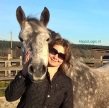The statement that a horse only works for ‘the treat’ and ‘not for you’ is one that I have heard many times. In fact this is one of the most common arguments used by people who use negative reinforcement to train their horses.
What motivates the horse: you or the food
I also prefer to think in terms of ‘motivation’ when I talk about horse training and horse behaviour: is the horse motivated to move away from something or avoid something (negative reinforcement, R-) or is he motivated by desire and wants to ‘move towards  something he wants’ (positive reinforcement, R+)?
something he wants’ (positive reinforcement, R+)?
When people say ‘the horse only does it for the food’ are they afraid of not being
‘respected by the horse’ for who they are? What is respect anyway? I don’t believe a horse respects a human the way people respect people. Most ‘respectful behaviours’ horses display in the human-horse relationship are either based on fear or simply on learned behaviours, see this post about respect.
If someone states: ‘The horse only does it for the food’, you could say the same thing for negative reinforcement: ‘He only does it to avoid something unpleasant’.
This is still not an explanation that the horse follows commands just ‘for the person’.
‘For the trainer’
I wonder how you could tell for sure that your horse is doing something ‘just for you’ and not for his own benefit (too)? That is very altruistic. Isn’t that a very cocky assumption that your horse does everything you ask, just for you and not for himself? I agree it is very tempting to tell ourselves our horse loves us so much he would do anything just for us, but it is not realistic.
Here is a video from my horse and how she reacts when I call her [for my lovely email subscribers please click in the email to go to the post to see the video]:
Is it really altruism?
Altruism is if a horse does something only to benefit another being (increasing it’s reproductive succes) and he doesn’t increases his own fitness. Example: You want to take your horse out of the pasture for a ride. If he comes to you and leaves his horsey companions without hesitation. Is it really for you as a person (and nothing else) or is there something else (too) at the root of this behaviour?
Curiosity
Maybe he is just curious and wants to check you out (that could explain the approach, but not the part where he leaves his heard and comes with you, hence the halter).
I think the more important part is the learning process that had taken place. Either the horse was positively or negatively reinforced in the past to come with you.
Positive reinforcement
If R+ is his motivation to come to and with you: he was motivated in the past by the scratches, food, attention or something else that is desirable for him. You paired pleasant experiences with coming to you and following you out of the pasture. The horse doesn’t do it for you (only).
Negative reinforcement
If he was negatively reinforced to come with you he is motivated by the aversive that was taken away to teach him to approach and follow you. For instance chasing the horse around in the pasture until he lets him catch you. After a few times the horse has learned to ‘give up’ running away from you and let you catch him. He paired stopping an unpleasant experience (being chased) with getting haltered. The horse doesn’t do it for you.
The beauty of R+
When you introduce positive reinforcement to a horse, he understands quickly that (in most cases) food is involved. Because we don’t randomly ‘throw’ treats to them, but only provide treats after the marker or bridge signal, the horse quickly learns to pay attention to the click and not to the hand reaching for a treat.
The reinforcer in positive reinforcement doesn’t have to be food, it can be anything pleasant the horse wants to work for.
There is more to clicker training than just the food reward. The marker can also become very reinforcing, training in itself (solving ‘puzzles’ when teaching new behaviours or endorfines released by physical activity or ‘the possibility of hearing a click’) can become reinforcing and also other behaviours can become reinforcers for behaviours.
So the horse doesn’t have to work for us (clicker trainers), because we know that he will pair us with positive things in training. We don’t mind that he wants to work for a decent salary paid in clicks and reinforcers. We understand this.
Safe the date: Thursday March 7, 2019
Ultimate Horse Training Formula, Your Key to Succes

- Want to get the results in training you really, really want?
- Want train your horse with confidence?
- Want to learn all there is to know about training your horse with positive reinforcement?
Join this online course and participate for free next time! Click here
Clicker Training Mastery (advanced course) starts March 6, 2019




Very well put, Sandra :-). You’ve hit on a few nerves here :-).
LikeLiked by 1 person
Thank you, Herthajames.
LikeLike
It’s so heartwarming when your horse learns to associate you with pleasure & runs up from the field when you arrive at the yard & you hear a gorgeously soft nicker when you go to bring him out to play. Love it!
LikeLiked by 1 person
I agree!
LikeLike